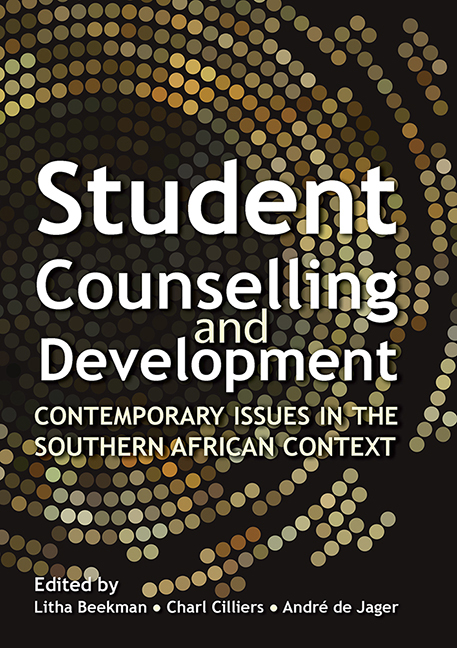 Student Counseling and Development in the South African Context
Student Counseling and Development in the South African Context Book contents
- Frontmatter
- Contents
- Figures
- Tables
- Preface
- Section 1 Development of Student Counselling and Development in Southern Africa
- Section 2 Theoretical Foundations of Student Counselling and Development in Higher Education
- Section 3 Services and Programmes Provided by Student Counselling and Development Units
- Section 4 Student Counselling and Development For Special Groups
- Section 5 Quality Assurance and Ethical and Professional Issues
- Contributors
- Index
Chapter 3 - Contemporary Challenges Facing the Student Counselling and Development Profession in Southern Africa
Published online by Cambridge University Press: 22 February 2020
- Frontmatter
- Contents
- Figures
- Tables
- Preface
- Section 1 Development of Student Counselling and Development in Southern Africa
- Section 2 Theoretical Foundations of Student Counselling and Development in Higher Education
- Section 3 Services and Programmes Provided by Student Counselling and Development Units
- Section 4 Student Counselling and Development For Special Groups
- Section 5 Quality Assurance and Ethical and Professional Issues
- Contributors
- Index
Summary
INTRODUCTION
Chapter 1 provided a historical overview of Student Counselling and Development (SCD) in South Africa. Three eras were described in the conceptualisation and delivery of SCD services and programmes: the reactive phase, the proactive phase, and the current integrative phase. These eras were associated with the social and political contexts of their day. Of special interest to this chapter are those contemporary challenges to SCD which continue to emerge as a result of the discipline's own democratisation and that of South Africa. It is clear that concomitant with societal and political changes in South Africa over the last two decades there have been substantial changes in the role of SCD in higher education (HE). These changes have included a dramatic increase in both the number and variety of student counselling services and programmes offered by different organisational units in the HE sector, not confined to traditional student counselling centres.
In this context, this chapter reflects on salient aspects of current SCD practice which provide challenges to SCD practitioners and to HE institutions in South and Southern Africa. In particular, seven challenges are highlighted. These are: (1) providing relevant services and development opportunities to an increasingly diverse student population; (2) adopting relevant theoretical foundations to inform practice and research; (3) dealing creatively with the diversification of the SCD role; (4) developing collaborative partnerships; (5) expanding research capacity among SCD staff; (6) the structural positioning of SCD services in HE institutions; and (7) the professionalisation of SCD. A reflection on the way forward concludes the chapter.
INCREASINGLY DIVERSE STUDENT POPULATION
The previous two decades have brought immense changes in the composition of South African student population. Prior to the 1990s HE in South Africa was largely segregated, with separate universities existing for the three major population groups: white, coloured and black. Small and carefully controlled numbers of students from other race groups were admitted to the historically white universities, often according to a quota system (Moodie, 1994). International collaboration was minimal, with international students being few and far between, and international student exchange programmes almost nonexistent. Mature students and students with disabilities were rare; distance education was the domain of one or two HE institutions. Student populations were, for the most part, homogeneous in terms of nationality, race group, age range, language and culture, proficiency in the language of instruction and educational standard.
- Type
- Chapter
- Information
- Student Counseling and Development in the South African ContextContemporary issuesin the Southern African Context, pp. 42 - 62Publisher: University of South AfricaPrint publication year: 2012
- 1
- Cited by
